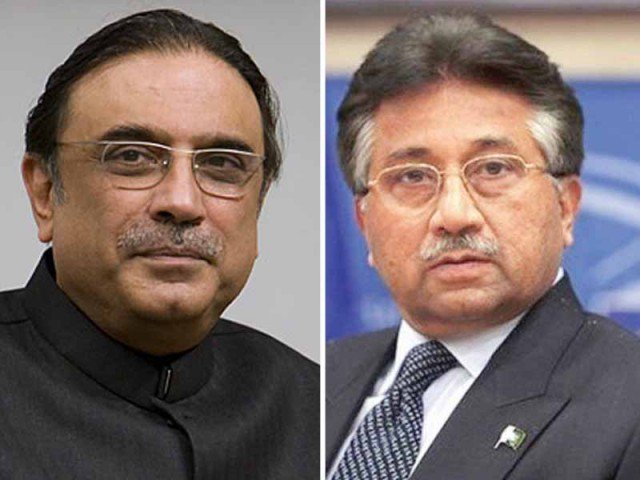SC to keep Musharraf, Zardari asset details confidential in NRO case
Directs NAB, federal govt to review Swiss accounts and NRO cases

PHOTO: FILE
A two-judge bench of the top court, comprising Justice Ijazul Ahsan and Justice Sajjad Ali Shah, has also sought a written reply from the government, the National Accountability Bureau (NAB) and the petitioner regarding maintainability of a constitutional petition.
The petition, filed by President of Lawyers Foundation for Justice Feroz Shah Gilani, had sought recovery of losses Pakistan incurred after the promulgation of the National Reconciliation Ordinance (NRO) by former military ruler General Pervez Musharraf.
SC hints at not moving against Asif Zardari in NRO case
In his petition, Gilani requested the court to order recovery of money misappropriated and wasted by the respondents through unlawful means “already on record in different judgments of the Supreme Court and high courts”.
He said Musharraf subverted the Constitution by declaring emergency followed by promulgation of the NRO, arbitrarily withdrawing criminal and corruption cases against politicians, including Pakistan Peoples Party Co-chairman Asif Ali Zardari – causing huge financial losses to the national exchequer.
Since the Supreme Court in its landmark judgment of Dec 16, 2009 has declared the NRO void ab initio, the respondents are liable to compensate for the losses and the damage suffered by the exchequer, including the loss of $60 million stashed in Swiss banks allegedly by Zardari, the petitioner said.
He said former attorney general Malik Qayyum wrote a letter to the attorney general for Geneva withdrawing criminal and civil proceedings against Zardari, but the Supreme Court in its 2009 judgment held that Qayyum had written the letter in his personal capacity against the Rules of Business, 1973.
“The actions of Mr Musharraf and Mr Qayyum by promulgating the NRO caused huge losses amounting to billions of rupees to debt-ridden Pakistan.
“Both willfully violated the oath of office to the detriment of the country in violation of the rule of the law, particularly of Articles 2, 2A, 25, 227 of the Constitution, the petition alleges,” he added.
After several hearings, the bench on Friday asked the applicant to satisfy the court regarding the maintainability of the petition. The court also asked the federal government and NAB to submit replies over the status of the Swiss cases which were reopened after the SC verdict.
After their response, the court will decide about the maintainability of the petition. The bench has also decided not to make public affidavits of Zardari, Musharraf and Qayyum regarding their asset details.
Justice Ahsan, however, made it clear that there would be no injustice with anyone as the decision would be taken in accordance with the law and the Constitution. The judge also questioned “what are the evidences to establish that the money stashed in Swiss banks is the country’s wealth”.
The petitioner requested the bench to grant him time as he was not provided complete documents. He contended that the SC in the NRO verdict mentioned that public money was lying in Swiss banks, adding that $60 million should be recovered.
Justice Ahsan inquired about evidence proving the money was stolen.
Zardari’s counsel Farooq H Naek said the PPP co-chairman had been acquitted in cases pertaining to money stashed in Swiss accounts.
Zardari challenges SC order seeking asset details
Additional Attorney General Nayyar Rizvi submitted that the NRO was a past and closed transaction and it would be inappropriate to reopen trial of the respondents through constitutional petitions. However, the bench asked him to give a written reply on the matter. Hearing of the case was adjourned for three weeks.
Interestingly, Zardari and his children have already submitted details of their assets. In the last hearing, Chief Justice of Pakistan (CJP) Mian Saqib Nisar had asked Naek to convey to Zardari that judges had no bias against anyone.
The bench had also asked the petitioner to justify his petition filed under the Articles 4 and 10A of the Constitution. “I think we should not proceed in this matter [any] further,” the CJP had said.
However, he changed his mind after going through the petition’s contents, emphasising on Article 4 of the Constitution, which says the right of individuals should be dealt with in accordance with the law.



















COMMENTS
Comments are moderated and generally will be posted if they are on-topic and not abusive.
For more information, please see our Comments FAQ